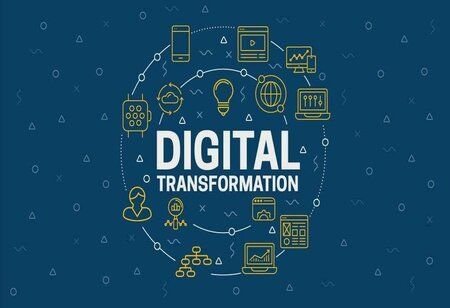As we move further into 2025, businesses are continuing to adapt to an increasingly digital world. Rapid advancements in technology, shifts in consumer behavior, and the global impact of the pandemic have all reshaped how businesses operate. The future of business lies in digital transformation, and companies that embrace these changes will thrive. Here are the top business trends in 2025 and how companies are adapting to the digital future.
1. The Rise of AI and Automation
Artificial intelligence (AI) and automation are no longer just buzzwords—they are essential tools driving business transformation. Companies are leveraging AI to streamline operations, reduce costs, and improve efficiency.
- AI in Customer Service: Chatbots and virtual assistants are becoming more sophisticated, providing personalized customer experiences and support 24/7.
- Automated Processes: From supply chain management to HR tasks, businesses are using AI-powered automation to handle repetitive tasks, freeing up human resources for more strategic work.
- Data Analytics: AI is also enabling companies to make data-driven decisions by analyzing massive volumes of data quickly and accurately.
By adopting AI and automation, companies can enhance productivity, reduce errors, and deliver better services to customers.
2. Remote and Hybrid Work Models
The pandemic accelerated the shift to remote work, and in 2025, many companies are maintaining or enhancing their remote and hybrid work models. Businesses are increasingly adopting flexible work environments to support employees and optimize productivity.
- Cloud-based Collaboration: Tools like Microsoft Teams, Slack, and Zoom are critical for facilitating seamless communication and collaboration among remote teams.
- Employee Well-being: Companies are focusing on mental health and well-being by offering more flexible work hours and supporting work-life balance.
- Global Talent Pool: Remote work enables companies to tap into a global talent pool, accessing the best talent regardless of geographic location.
As businesses continue to embrace these models, they are creating more inclusive and efficient work environments that cater to the needs of modern employees.
3. Digital Transformation in Operations
Digital transformation is at the core of business strategies in 2025. Organizations are adopting digital technologies to improve their operations, from customer interactions to internal processes.
- Cloud Computing: More businesses are migrating to the cloud for greater flexibility, scalability, and cost-efficiency. Cloud solutions allow companies to store data, manage applications, and collaborate without relying on physical infrastructure.
- Supply Chain Innovation: With the help of IoT (Internet of Things) and AI, businesses are transforming their supply chains to become more transparent, efficient, and responsive to market demands.
- Business Intelligence Tools: Companies are investing in advanced analytics tools to gain real-time insights into their operations, enabling smarter decision-making.
In 2025, companies that embrace digital transformation will have a competitive advantage by optimizing operations and improving customer experiences.
4. The Growth of E-Commerce and Online Shopping
E-commerce continues to grow, and by 2025, more businesses are shifting their focus to online channels. The rapid growth of digital shopping is transforming industries, from retail to consumer services.
- Omni-channel Strategies: Companies are offering customers a seamless shopping experience across online, in-store, and mobile platforms. This means integrating physical and digital touchpoints to meet the expectations of today’s tech-savvy consumers.
- Subscription Services: Subscription-based business models are growing across industries, offering consumers convenience and businesses steady, recurring revenue.
- Social Commerce: Social media platforms like Instagram, Facebook, and TikTok are becoming shopping destinations, allowing businesses to sell products directly through social channels.
To stay competitive, companies are focusing on creating easy, frictionless online shopping experiences that cater to consumer preferences for convenience and speed.
5. Sustainability and Green Business Practices
Sustainability is becoming a top priority for businesses in 2025. With increasing awareness about climate change and environmental issues, companies are making sustainability a core part of their operations.
- Green Products and Services: Businesses are developing products and services that are environmentally friendly, such as eco-friendly packaging, renewable energy solutions, and sustainable fashion lines.
- Carbon Footprint Reduction: Companies are investing in renewable energy, reducing waste, and optimizing supply chains to lower their carbon footprints.
- Sustainable Supply Chains: Companies are adopting green practices in their supply chains, ensuring that their suppliers adhere to environmental standards and practices.
Consumers are also increasingly demanding that businesses take responsibility for their environmental impact. As a result, businesses that invest in sustainability will not only reduce their environmental footprint but also strengthen their brand reputation.
6. Personalization and Customer-Centric Marketing
In 2025, businesses are focusing more than ever on personalizing their marketing efforts. Thanks to advancements in AI and data analytics, companies can now offer highly targeted, individualized experiences that resonate with customers.
- Data-Driven Marketing: Companies are using customer data to personalize content, offers, and recommendations, creating unique experiences that appeal to each individual’s preferences.
- Dynamic Websites and Ads: Websites and ads are becoming more personalized based on browsing history, location, and purchasing habits, leading to higher conversion rates.
- Customer Loyalty Programs: Personalized loyalty programs are offering more value to customers, encouraging repeat business through tailored rewards and incentives.
By leveraging data, businesses can create meaningful relationships with customers, driving loyalty and increasing revenue.
7. Blockchain and Secure Digital Transactions
Blockchain technology is gaining traction in 2025, especially in industries that require secure, transparent transactions. From finance to supply chain management, blockchain is providing a decentralized, tamper-proof system that enhances trust and security.
- Cryptocurrency and Payments: Blockchain is powering cryptocurrencies like Bitcoin, and many companies are integrating cryptocurrency payment options to cater to a growing digital currency user base.
- Supply Chain Tracking: Blockchain is enabling transparent, real-time tracking of goods in the supply chain, enhancing trust and reducing fraud.
- Smart Contracts: Smart contracts are automating agreements and transactions, ensuring they are executed without the need for intermediaries, reducing time and costs.
As businesses move towards more secure, digital transactions, blockchain will play a pivotal role in reducing fraud and increasing transparency.
8. Virtual and Augmented Reality Experiences
Virtual reality (VR) and augmented reality (AR) are becoming mainstream in business applications. These technologies are enhancing the customer experience, offering immersive and interactive solutions.
- Virtual Showrooms: Retailers are using AR to allow customers to virtually try products like clothing or furniture before purchasing, providing a more engaging and personalized shopping experience.
- Training and Simulation: VR is being used for employee training, enabling workers to practice tasks in a simulated environment without real-world consequences.
- Enhanced Customer Engagement: Companies are using VR to create immersive marketing campaigns that increase engagement and strengthen brand loyalty.
As VR and AR become more accessible, businesses are finding new ways to leverage these technologies to improve customer interactions and business operations.
9. Cybersecurity and Data Protection
With the increasing amount of data being shared and stored online, cybersecurity is more important than ever in 2025. Businesses are investing heavily in protecting customer data and their own digital infrastructure from cyber threats.
- AI-Driven Security: AI is being used to detect and respond to cybersecurity threats in real time, improving overall data protection.
- Zero Trust Models: Companies are adopting zero-trust security models, where no user or device is trusted by default, reducing the risk of internal threats.
- Data Privacy Regulations: With stricter data protection regulations like GDPR, businesses are focusing on maintaining compliance to avoid penalties and build trust with customers.
Data security is critical in maintaining customer confidence and protecting sensitive business information in the digital age.
Conclusion: Embracing the Future of Business
In 2025, businesses that embrace digital transformation, sustainability, and innovation will be the ones to thrive. From AI and automation to blockchain and VR, technology is reshaping the business landscape, offering new opportunities for growth and customer engagement. Companies must stay agile, adopt new technologies, and focus on building customer-centric experiences to remain competitive. By doing so, they will not only adapt to the digital future but also lead the charge into a new era of business.



